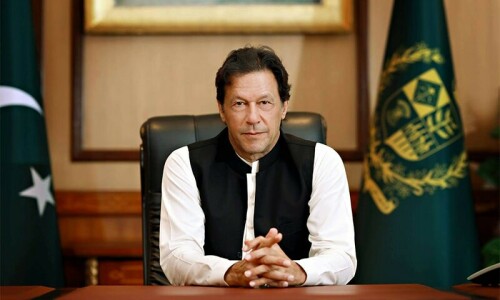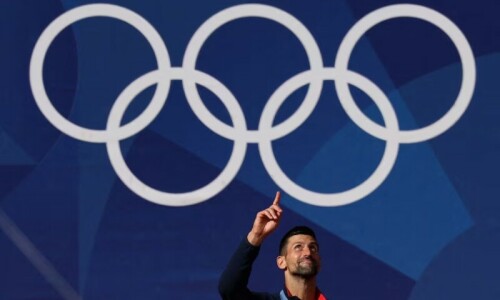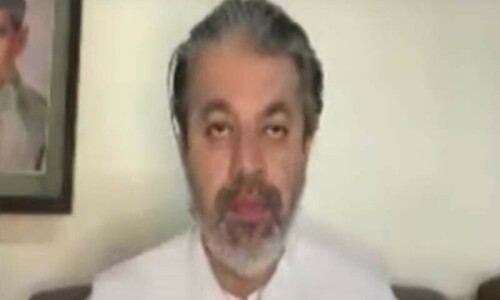PESHAWAR: Few in the small Arab community knew Ahmad Fadil Al Khalaileh, who later came to be known as Musab al-Zarqawi, when he arrived in Peshawar in 1989, towards the fag-end of the Soviet occupation of Afghanistan, to take part in the holy war against the Red Army.
Like other Arabs landing in Peshawar, the Jordanian stayed at Baitushuhada or the House of Martyrs in Peshawar’s posh Hayatabad residential area. The ‘safe house’, also known as midway house, was operated by fellow Jordanian scholar, Abdullah Azzam’s Maktabal Khidamat.
According to one account, Zarqawi had little combat experience; the only time he took part in an action was in Khost, south-eastern Afghanistan, under the command of Abu Al Harith Al Salti. He spent much of his time writing for an Arabic magazine, Al Bonian Al-Marsoos, owned and run by Ittehad-i-Islami Afghanistan chief Professor Abdur Rab Rasul Sayyaf.
Prof Sayyaf had close ties with Saudis and Arab radicals. Later, he aligned himself with the Northern Alliance against the Taliban and is now a member of the Afghan parliament.
It was during his stay in Peshawar that Zarqawi came into contact with another radical scholar, also a Jordanian, Isam Al Barqawi alias Abu Muhamad Al Maqdassi.
Maqdassi is said to have had a profound impact in the making of Zarqawi’s as a radical Salafi. Maqdassi himself had been influenced by the teachings of Abdullah Azzam, a fiery speaker, who had gained prominence in the Arab radical circle long before Osama bin Ladin emerged on the horizon. Azzam was assassinated in a car explosion outside a mosque in the University Town of Peshawar in November 1989.
In 1992, both Zarqawi and Maqdassi returned to Jordan where he set up ‘Baitul Imam’ or the house of the leader to help returning Jordanian veterans of the Afghan war.
In March 1994, Zarqawi and Maqdassi were arrested and both of them were sentenced to 15 years in prison on charges of trying to overthrow the government.
Zarqawi was, however, released in 1999 under a general amnesty by King Abdullah and he immediately returned to Peshawar. He lived in a house in Hayatabad, opposite the beautiful Bagh-i-Naran, for about six months.
One account says that the Jordanian militant stayed with his sister who was married to another Jordanian, Saleh Al-Hami alias Abu Qadama. (Incidentally, Qadama was arrested by Jordanian police on Thursday, while he was giving an interview to Al Jazeera on the death of his brother-in-law).
There are conflicting reports about later events. One account says that Zarqawi was arrested and detained in Peshawar after his visa had expired, while according to another account, he was forced to flee to Afghanistan following a crackdown on Arabs in Peshawar.
In Afghanistan, Mr Zarqawi set up a training camp near Jalalabad in the eastern Nangrahar province. He moved and relocated to Herat in western Afghanistan to train between 80 and 100 Jordanians and Syrians.
It is interesting that all this while Zarqawi had declined to take baya’t or oath of allegiance to Osama bin Laden and ran his own organisation under the banner of Tawheed Wal Jihad.
Zarqawi had his first brush with the Americans in Herat, when the invading troops raided a hospital. Zarqawi was wounded and he left Afghanistan along with scores of his comrades.
Investigators in Peshawar said that Zarqawi and some of his comrades moved to Shakai in South Waziristan and stayed in the house of two Spirkai Wazir tribesmen, Edda Khan and Dawar Khan. Both the tribesmen have been in the custody of military authorities since May, 2004.
During his stay in Shakai, an area that served as sanctuary for foreign militants till the army regained its control, Zarqawi befriended the late militant commander Nek Muhammad and his successor Maulavi Muhammad Omar.
It is not clear as to how long did he live in Waziristan but investigators say that he left Pakistan via Balochistan in 2002 and reached Iraq via Iran stopping over in Mashhad for a while.
In Iraq, he was believed to have teamed up with Kurdish Ansarul Islam led by Mullah Krekar. It was a coincidence that Zarqawi happened to be in Iraq when the US invaded the country in March 2003. He took no time in resurrecting his Tawheed Wal Jihad and teamed up with hundreds of Iraqi veterans of the Afghan jihad to take on the United States and shoot to prominence, overshadowing Osama bin Laden.















































Dear visitor, the comments section is undergoing an overhaul and will return soon.